If you are looking to soundproof your room on a budget, you will likely be faced with tons of options, including using memory foam. As you may have rightly suggested, not all of these options effectively block out the noise.
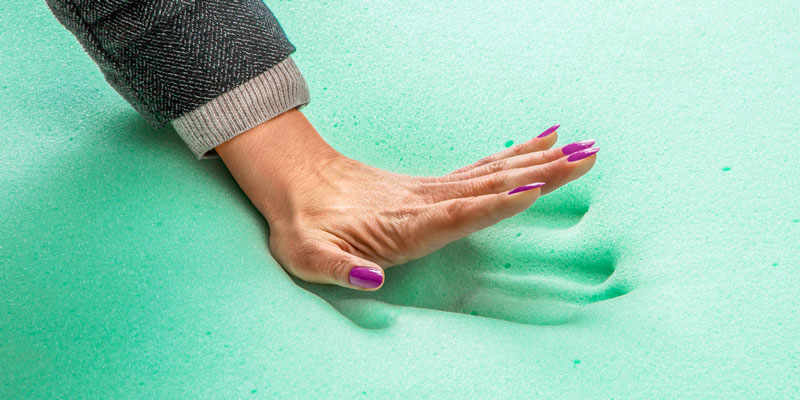
This brings us to the question: is Memory Foam good for soundproofing?
In a simple answer, No. mattress foams are great for tackling sound distortion and echo. However, they are not the best option when it comes to effectively soundproofing a room since they lack enough mass. Besides, they are not designed for Acoustics.
Hence, in this post, I will discuss the performance of memory foam for acoustics and soundproofing in detail. While they might not be the best option for soundproofing, they can help with sound management.
Do Foam Absorb Sound?
Different materials absorb and reflect sound waves in varying ways. So, when soundproofing a room, studio office, etc., you want to consider the materials’ sound-absorbing or reflecting capacities.
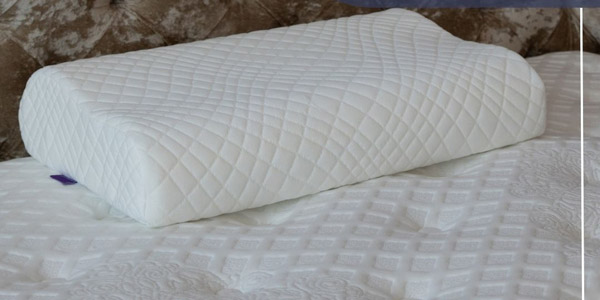
For recording studios, it’s best to opt for materials that are great at absorbing sound waves. And one of the budget-friendly options is foam, thanks to its construction and physical qualities.
Also, the type of foam used – porosity and shape – determines how well it absorbs sound waves. Highly porous materials such as fabrics and foam are excellent sound absorbers.
However, there are different types of foam – closed-celled foam and open-celled foam.
Open-celled Foam
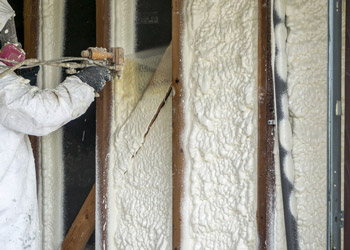
Most foams are highly porous and airy, which is the physical characteristic of open-celled foam. Hence, you should expect sound waves to travel through them, considering their physical qualities, and be absorbed. Open-celled foams are less likely to reflect sound waves. Therefore, they are your go-to for absorbing all types of sounds and liquids.
Closed-celled Foam
This type of foam comes in different styles. They share the same porosity level as open-celled foam, albeit less airy. Since they offer less airiness, closed-celled foam is tightly woven, which means only sound with lower frequencies is absorbed.
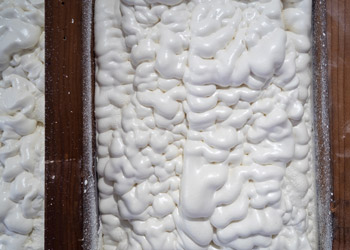
Air carries the sound waves as energy vibration that interacts with any obstacle.
Therefore, the ability of sound to be transmitted depends wholly on the type of material or obstacle it encounters. With sound waves being energy foam, it’s easier for the foam to absorb them.
Soundproofing and Mattress Foam
As said earlier, mattress foam is not the best option when it comes to soundproofing. If you take out your mattress from your bed and try to look through it, you will notice that light can pass through and sound.
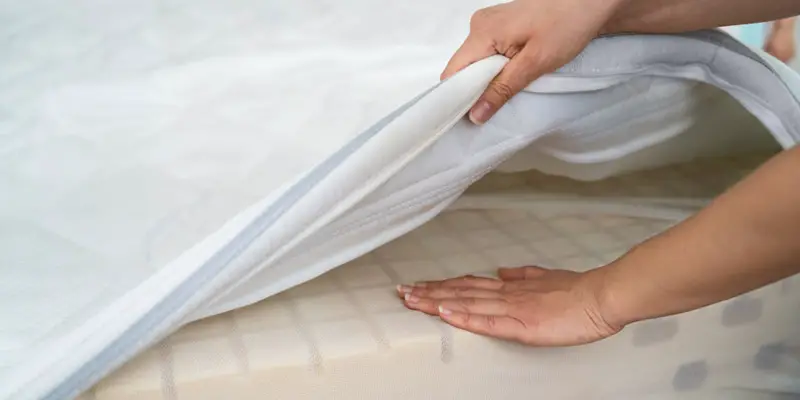
However, the misconception comes from mattress foam looking like some acoustic accessories used on the recording studios’ walls. This foam-like accessory is not meant for soundproofing the studio but for audio control.
This product is commonly called acoustic foam. It looks like a mattress foam or foam egg carton. It’s great at audio management and has nothing to do with soundproofing the room.
No doubt, recording studios need to be soundproof, and this is achieved in many ways, from building huge mass walls to decoupling. They opt for the traditional method of soundproofing a room instead of hanging soundproofing materials on the walls.
Most acoustic accessories hanging on the walls are for audio management to help deal with sound distortion, reverberation, and echo. Therefore, using acoustic foam in your home will only help solve sound distortion and improve audio quality but won’t help block sound from migrating in or out of your room.
Not only acoustic foam, but recording studios also combine this product with bass traps and acoustic panels to do one thing – audio management. In short, mattress foam, like egg cartons, is not ideal for soundproofing a room.
Notwithstanding, there are other benefits or roles mattress foam plays in a budget soundproofing project.
Pros & Cons of Using Memory Foam for Soundproofing
While using memory foam for acoustic reasons, we found that it helps improve audio quality only slightly. Mattress foam does not deliver the same performance as typical acoustic foam, but we notice a better audio quality without using any foam in the room.
Below are the pros and cons of using memory foam for better audio quality:
Pros:
- Memory foam is cheap and easy to come by, and since you’ll need plenty of them, you don’t have to break the bank to get the right amount of foam required.
- Memory foam can improve audio quality to a slightly significant level with strategic usage and placement.
- Memory foams are easy to work with, especially if you know your way around a sewing machine.
Cons:
- While mattress foam can improve your audio quality, it’s not as effective as acoustic foam. It’s not designed to absorb sound waves.
- Memory foam is helpless when it comes to soundproofing. If you are looking for a material to help block out the noise, mattress foam is the wrong pick.
- Mattress foam, on its own, isn’t visually appealing. This means you’ll have to hide it or spend quality time trying to make it look attractive and match your room’s decor.
- Although memory foam is cheap, proper acoustic foam isn’t really expensive. If you are tight on budget, the acoustic foam won’t require you to break the bank. Otherwise, focus on soundproofing your room instead of adding accessories for acoustic management.
Does Soundproof Foam Really Work?
Another common misconception – foam won’t stop noise from migrating into your room or keep the sound within the confines of your wall. Either soundproof foam or acoustic foam – whatever they are called – are meant for acoustic management and not blocking sound waves.
So, Is Memory Foam Good For Soundproofing?
No, it’s not a soundproofing material. Your mattress foam is not dense enough to stop sound waves. However, a low budget demands some creativity. Nonetheless, using memory foam won’t soundproof your room. This material would only help manage echo and sound distortion for better audio quality.
However, we recommend you purchase acoustic foam for better audio control.
